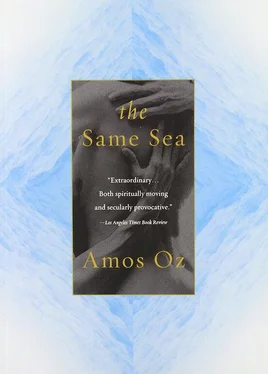Like a well where you wait to hear
Toward evening the boy, who still called him Yourr Honorr, would whistle to drag him out of the dungeon of sweaty sleep, and the two of them would climb the hill to catch crickets, or go to the seashore to pick up seashells to sell. They saw Superman together twice at the Globe Cinema and when they came out they wrestled panting on the grass. He went to the store run by the man from Taiwan and from his meager savings he bought the child a pair of khaki shorts, some vests, sandals with soles made from tires, he ended up looking like a young scamp from Israel in the old days. Each evening he bought him a Coke, some dates, bubble gum, occasionally a sticky brown sweet made locally from coconut and honey. He taught him to play a game of marbles from Tel Aviv, and they also made a kite. At night, on duty, you used to grill him a fish over the fire and talk, and the boy would listen, and sometimes a sly look flickered across his face which showed for an instant that he was not always as angelic as he looked. In the mornings, for instance, when you were asleep would he curl up in a heap of rags in the disused refrigeration unit, or on a battered mattress in some shed, or would he go off somewhere else to collect what was due to him? One day you bought him a bubble pipe from the Taiwanese, and that is how you were seen, an angular, tousled young man in jeans and a T-shirt with a Hebrew slogan ("Let the animals live"), with a dark-skinned, rather feminine little boy, in a pair of new sandals and a kibbutz-style vest which had once been white, the two of you blowing bubbles. So what if some people were beginning to gossip, at the hostel, at the refrigeration plant. The philandering Austrian engineer slapped you in various places and leered, neighing Ach so! At the kiosk, when you had finished blowing bubbles, the boy learned from you the latest Tel Aviv slang. Then you bought two sticks of chewing gum and you sat chewing together on the stone opposite the petrol pump. Perhaps you should ask some passing tourist to take a Polaroid photo. And send it In a letter. So they'd know. This child, listen, looks at you like a little abandoned monkey, not exactly looking you in the eye, more in the mouth, as though through your mouth he can see what's inside you. Besides which, he taught me a trick with a coin, the Devil only knows who taught it to him and what other things he knows without anyone knowing. He's like one of those lizards where if you pull off their tail they grow a new one, or more precisely like a well where you throw a stone in and wait to hear but you don't hear anything.
Question in a dream: and what was the fate of that well-mannered man, the draper who always knew what to say and what to pass over in silence? The man who was Nadia Danon's first husband? A scrubbed and scented, cheerful man, inclined to fixed habits, who sang Sabbath songs delightfully in a rich, resonant tenor voice. He may be living to this day in a suburb of Marseilles or Nice, pink-cheeked, flourishing, surrounded by charming widows. Or perhaps he is here in Israel, living in Kiryat Ono, a widower and pensioner, the treasurer of the House Committee, still hoping that one day his only daughter Rachel, a twice-divorced doctor of forty, will return from San Antonio or Toronto, marry a moderately observant Jew, open her own private clinic, and invite him to live with them, let's say in a modest little cabin at the end of their garden. To his question in a dream he receives a negative answer. She is there and you are here, totally on your own since the day Rex was run over. You have to get over your grief, put on a jacket and tie, pick up your carved cane, and go to the Animal Protection Society to choose yourself a new puppy despite everything, and start all over again. But it will be difficult to relate to a new puppy now: if you call him Rex he will remind you every day that Rex no longer exists, and if you call him Chief he won't help you forget anything. Better to give up dream questions and get on at last with finding a replacement for that refrigerator that rumbles like a heavy smoker and interrupts your sleep.
It's cold tonight. And rainy.
His hands are so thin.
He's not really old
and I'm not in his arms.
His hands are so tender
clasped in my palms,
I'm changing a baby
born to me from his son.
He's really not old. Restless,
the sea outside in the dark
exhales. Thrashes. Gropes
the sandy beach with its waves.
As though changing his grandson
my hands encircle his.
For a moment he was a baby,
but now he's a father again.
He closes his eyes to keep watch
A small surprise party: the people who work at the Property Tax Board are
saying goodbye tonight to an old colleague who has reached retirement age.
So from eight to midnight Albert has offered to look after Bettine's
grandchildren who are sleeping in her bed. On a shelf in her bedroom is
a photo of her husband Avram, a distant relation of Nadia's, with a precisely
trimmed grey moustache, and a beret on his head. A smell of talc and
shampoo enfolds Bettine's habitual faint perfume. The little girl is fast asleep,
clutching a sheep with a missing ear, from time to time in her sleep she takes
a single deep breath. The boy is tossing and turning, he's worried, he fears
the worst, he thinks there's a bear lurking in the corridor. In vain Albert
carries him outside to see for himself that there's nothing there. He is
frightened. He wants his mummy. He wants Granny 'Tine. He wants
the light on. He asks Albert to turn off the dark, quick. In vain Albert sings
a Serbian lullaby from his childhood in Sarajevo and another haunting song
in Bulgarian with which Nadia used to lull Rico and herself to sleep. In vain.
A faint light comes from the kitchen and a glimmer from a street lamp enters through the window, trembling slightly because of
the sea breeze stirring in the chinaberry tree. Albert goes to the kitchen
to warm a bottle that Nadia has prepared before she went out. Bettine,
he corrects himself. But Nadia won't let go. He returns to the bedroom
and finds the boy asleep. Now he goes down on his knees on the matting
to pick up the animals, bricks, books, a xylophone missing two of its bars,
stoops to lay a teddy bear by the boy's shoulder, covers both children with
a blanket, sits down in Bettine's armchair, and closes his eyes to keep watch.
— till one evening he does not come to whistle, Wake up Yourr Honorr, let's
go get a Coke, and then let's go shrimping in the shallow rock pools in
the bay. First you scan the sky for the dragon kite you made him. Not there.
That night he does not pop out as usual from the shadows behind the pipes
and the smell of grilled fish.
Nor the next day.
He has disappeared.
In vain you go looking for him at the plant, in the cellars, on the shore, in
his disused refrigerator, to no avail you quiz the soft-drink seller
in the square or the Taiwanese storekeeper: vest khaki shorts a pair of
suspenders like an H? Always lugging a bag full of snails and Coca-Cola tops?
No use. So many children are abandoned here, cocksuckers, beggars,
pickpockets, who can tell them apart? The fishermen you question
this morning snicker, wink, what's the problem, find another one instead,
there's no shortage of his sort here. Has he been kidnapped? Got lost?
Drowned? Or found another uncle on the side? Only yesterday you washed
Читать дальше












